The Quebec election .. bigger things are looming over Canada now (sort of)?
Feb 21st, 2007 | By Citizen X | Category: Canadian Provinces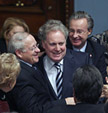 Whatever new Canadian political adventures may lie ahead in the possibly fateful year of 2007, something seems to have shifted into a higher gear with the news that there really will be a Quebec provincial election on March 26. The further clarification that a Stephen Harper federal budget with good news for Quebecers is now slated for March 19 just thickens the plot.
Whatever new Canadian political adventures may lie ahead in the possibly fateful year of 2007, something seems to have shifted into a higher gear with the news that there really will be a Quebec provincial election on March 26. The further clarification that a Stephen Harper federal budget with good news for Quebecers is now slated for March 19 just thickens the plot.
There will also be, for certain, a new fixed-date Ontario provincial election on October 10 this year – and possibly (or even probably?) an Alberta provincial election at some point in 2007 as well. Many Canadian people will be exercising their democratic franchise, even if there is no third federal election in three years. Quebec, as usual, will be starting the journey. But as it proceeds it may make waves on all the great waterways of Canada, coast to coast to coast. This could be a year full of events that alter and illuminate our time.
The man in Quebec to watch is Mario Dumont …
 The working week of February 12-16 saw the start of big media pundtry on the March 26 Quebec provincial election – as well as the wider public recognition that the election was almost certainly going to take place on the date specified, in what were then only media predictions.
The working week of February 12-16 saw the start of big media pundtry on the March 26 Quebec provincial election – as well as the wider public recognition that the election was almost certainly going to take place on the date specified, in what were then only media predictions.
(Note, e.g., the February 15 headline in Le Devoir:”L’Assemble nationale est convoque d’urgence pour mardi prochain, ce qui est une preuve supplmentaire, si besoin en tait, que les lections seront dcrtes ds la semaine prochaine.” At that point we could only know for certain on “mardi prochain” – or, as was said in the Toronto Star, “Feb. 20.” [Or, more exactly, it was later said in Halifax, Wednesday, February 21.] But it would have come as a very big surprise if the always shrewd and energetic francophone media’s tea-leaf readings had proved wrong – even allowing that there have been quite a few big surprises in Canadian politics lately.)
 The most intriguing news to come out of the early punditry, albeit as filtered through the anglophone media, is that the 2007 Quebec provincial election may mark some kind of watershed in the evolution of even the francophone mood in la belle province, and in French Canada at large, at long last. And if something like this proves true, it could of course have some interesting implications for the rest of Canada as well.
The most intriguing news to come out of the early punditry, albeit as filtered through the anglophone media, is that the 2007 Quebec provincial election may mark some kind of watershed in the evolution of even the francophone mood in la belle province, and in French Canada at large, at long last. And if something like this proves true, it could of course have some interesting implications for the rest of Canada as well.
Some will say these implications could be quite benign, and even good. Others will judge them as bad at best. What seems at least tantalizing at the moment is the prospect that they could mark some form of effective abatement of the increasingly monotonous and destructive federalist vs. sovereigntist debate in Quebec, that has dominated the past generation and more, among the descendants of the first people who called themselves Canadians, and their present-day migrant acolytes and fellow citizens, in the (francophone division of the) global village.
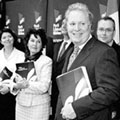 This is not by any means to say that the old-style “federalists” have won – far from it. (As anyone listening to the latest international pronouncements of even Quebec’s current federalist premier Jean Charest might have guessed.) The new francophone/anglophone compromise that may be looming on the horizon is something much more in the spirit of the resolution so overwhelmingly endorsed by the elected federal Parliament of Canada late this past November, about how “the Quebecois” are a nation “within a united Canada.”
This is not by any means to say that the old-style “federalists” have won – far from it. (As anyone listening to the latest international pronouncements of even Quebec’s current federalist premier Jean Charest might have guessed.) The new francophone/anglophone compromise that may be looming on the horizon is something much more in the spirit of the resolution so overwhelmingly endorsed by the elected federal Parliament of Canada late this past November, about how “the Quebecois” are a nation “within a united Canada.”
One practical problem with all this at the moment is that while the symbolism of such a proposition may be able to mobilize a new majority in Quebec, the early opinion polling makes clear that it does not as yet have the same capacity at all in Canada outside Quebec. Yet there are many anglophone politicians who, weary after many years of vain struggle for unworkable old ideals of nationality, believe it is nonetheless the right way to go in the long run. And they can say that Canadians outside Quebec will finally come to endorse this view of Quebec’s place in Canada too, once they see what it really means practically, and the advantages it will have for them. (Which of course may or may not prove true.)
 However you look at it, it would almost certainly be better for the ultimate cause and ongoing political stability of Canada at large to spend the next generation debating just what the Quebecois as a nation within a united Canada means practically, than to spend it continuing the increasingly fruitless and fraudulent non-debate over what the secession of Quebec from the Canadian confederation would mean. (Especially as it has become increasingly obvious to many deep thinkers in both official languages that any such secession can only finally mean the destruction of Canada, and no doubt ultimately francophone Quebec along with it.)
However you look at it, it would almost certainly be better for the ultimate cause and ongoing political stability of Canada at large to spend the next generation debating just what the Quebecois as a nation within a united Canada means practically, than to spend it continuing the increasingly fruitless and fraudulent non-debate over what the secession of Quebec from the Canadian confederation would mean. (Especially as it has become increasingly obvious to many deep thinkers in both official languages that any such secession can only finally mean the destruction of Canada, and no doubt ultimately francophone Quebec along with it.)
The practical point at the moment, in any event, is just whether enough of the francophone majority in Quebec is ready to shift allegiance from the old sovereigntist cause to some new compromise position, somewhere between the old sovereigntism and the old federalism. And the practical political card carrier for this option (still very vaguely defined, of course) is Mario Dumont, leader of the third party in Quebec provincial politics today (or Quebec national politics as many in Quebec see it), known as the Action dmocratique du Qubec (ADQ).
 The current optimistic anglophone-francophone punditry plot here is not that M. Dumont and the ADQ will actually win the election now expected on March 26. They are not at all strong or well-seasoned enough to do anything like that. The plot is that their vague compromise middle-ground option on “Quebec nationalism” just may steal enough votes from the still theoretically sovereigntist Parti Quebecois, to let Jean Charest’s current so-called federalist Liberal government win a healthy second back-to-back majority of seats in L’Assemble nationale.
The current optimistic anglophone-francophone punditry plot here is not that M. Dumont and the ADQ will actually win the election now expected on March 26. They are not at all strong or well-seasoned enough to do anything like that. The plot is that their vague compromise middle-ground option on “Quebec nationalism” just may steal enough votes from the still theoretically sovereigntist Parti Quebecois, to let Jean Charest’s current so-called federalist Liberal government win a healthy second back-to-back majority of seats in L’Assemble nationale.
And, if this is what does happen on March 26, that could start to destablizie the Parti Quebecois – and the wider Quebec sovereigntist movement, including M. Duceppe’s Bloc Quebecois in Ottawa – in some big enough new ways. And that just might finally start to open up some at least attractively fresh and different real-world possibilities, on both the Quebec and wider Canadian horizons, for the first time in more than a generation.
Is there a new conservative mood in Quebec too … and what about compromises on autos in Ontario, oil in Alberta, the environment, and all that?
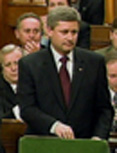 Whatever else the old central Canadian media conspiracy might think about Canada’s new minority Conservative prime minister, many of its most illustrious members are starting to show some grudging respect for his political ear and strategic sense on Quebec. (He was after all born and raised in the Toronto inner suburb of Leaside, before he set off to make his fame and fortune way out west in Calgary, Alberta.)
Whatever else the old central Canadian media conspiracy might think about Canada’s new minority Conservative prime minister, many of its most illustrious members are starting to show some grudging respect for his political ear and strategic sense on Quebec. (He was after all born and raised in the Toronto inner suburb of Leaside, before he set off to make his fame and fortune way out west in Calgary, Alberta.)
The scheduling of a federal budget with good news for Quebecers on March 19, just as the Quebec campaign is about to conclude, is at least for the moment being widely seen as a brilliant stroke, in a grand old neo-Machiavellian Canadian nation-building tradition. (And the continuing wider proposition here is that Mr. Harper’s new and more open and decentralized conception of Canadian federalism just might be what the new mood in Quebec is looking for too.)
 Another sign of potential Harperian engagement with the rising new tide on the banks of the St. Lawrence River turns around intriguing reports of a growing new conservative mood in Quebec. No less an authority than the old sovereigntist local hero Lucien Bouchard (with his attractive wife from California) has lately been raising concerns about the longer-term economic sustainability of the current Quebec social service state – which is so much grander (and eats up so many more tax dollars) than elsewhere in the confederation.
Another sign of potential Harperian engagement with the rising new tide on the banks of the St. Lawrence River turns around intriguing reports of a growing new conservative mood in Quebec. No less an authority than the old sovereigntist local hero Lucien Bouchard (with his attractive wife from California) has lately been raising concerns about the longer-term economic sustainability of the current Quebec social service state – which is so much grander (and eats up so many more tax dollars) than elsewhere in the confederation.
As Conrad Black can tell you (see his first book, on Duplessis), Quebec nationalism has always had its right as well as it left ideological brands. Some francophone Quebec pundits who talk to anglophone Canadians are reporting that some potential big-time rightward brand shifting could be in the current winds of change too. It will be interesting to see how true this is on March 26.
 Thie working week of February 12-16 also saw some intriguing news on the important auto manufacturing sector in Quebec and (much more importantly) in Ontario. And even that may open some additional doors for Mr. Harper, as he struggles to juggle all the fractious regional interests on what he calls the “eclectic” Canadian national scene – and integrate them into the kind of credible enough Canada-wide environmental policy that just might get him the majority government he craves in the next federal election, whenever that comes.
Thie working week of February 12-16 also saw some intriguing news on the important auto manufacturing sector in Quebec and (much more importantly) in Ontario. And even that may open some additional doors for Mr. Harper, as he struggles to juggle all the fractious regional interests on what he calls the “eclectic” Canadian national scene – and integrate them into the kind of credible enough Canada-wide environmental policy that just might get him the majority government he craves in the next federal election, whenever that comes.
What CNN called the “Valentine’s Day massacre” in the North American auto industry had its own vibrations up in the snowy true north. Canadian Auto Workers’ chief Buzz Hargrove branded the Chrysler job cuts announced on February 14 an “absolute disaster.” And he said they point to an increasingly desperate need for much more aggressive government trade policies. North American governments shouldn’t be letting other countries sell their auto products here, unless we can sell our products there too.
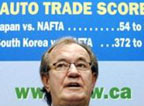 Ontario premier Dalton McGuinty, Mr. Hargrove said, will be convening representatives of labour, management, and municipal governments to brainstorm on the subject, and urge new directions on Stephen Harper’s minority federal government in Ottawa. Oddly enough, there seem some aspects of this plot Mr. Harper could actually like. It was interesting, e.g., to hear Buzz Hargrove’s answers to questions on the auto sector and environmental policy at his February 14 press conference. Canada can’t really boost automobile gas mileage standards, he quite clearly seemed to be implying, until the US federal government does it first.
Ontario premier Dalton McGuinty, Mr. Hargrove said, will be convening representatives of labour, management, and municipal governments to brainstorm on the subject, and urge new directions on Stephen Harper’s minority federal government in Ottawa. Oddly enough, there seem some aspects of this plot Mr. Harper could actually like. It was interesting, e.g., to hear Buzz Hargrove’s answers to questions on the auto sector and environmental policy at his February 14 press conference. Canada can’t really boost automobile gas mileage standards, he quite clearly seemed to be implying, until the US federal government does it first.
Or, we can’t be making automobiles in Canada (principally Ontario nowadays, right next door to Michigan) that can’t be sold in Canada, and logically expect to sell them in the United States. That wouldn’t be fair and reciprocal free trade either. And right now many if not most of the auto models made in Ontario for the North American market are apparently big gas guzzlers. So, you might guess, Stephen Harper must be thinking to himself that’s nice. If we can’t put too much of an immediate boost on environmental standards for automobiles without damaging the Ontario regional economy, we can’t put too much of a boost on standards for the oil sands without damaging the Alberta regional economy too.
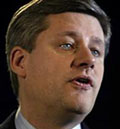 Meanwhile, Quebec and British Columbia can carry on greening their regional economies, with handy dollars from the new federal Eco Fund, etc. And that’s another thorny major problem of contemporary Canadian public policy solved by the Man from the West who was born in Toronto and now lives in Calgary (and Ottawa, at the moment) – and who will have finally earned a majority government in the eyes of all those potentially receptive strategic voters in the wilds of Ontario, beyond the current megacity of Toronto (and of course enough other voters in the new Quebec and Atlantic Canada too).
Meanwhile, Quebec and British Columbia can carry on greening their regional economies, with handy dollars from the new federal Eco Fund, etc. And that’s another thorny major problem of contemporary Canadian public policy solved by the Man from the West who was born in Toronto and now lives in Calgary (and Ottawa, at the moment) – and who will have finally earned a majority government in the eyes of all those potentially receptive strategic voters in the wilds of Ontario, beyond the current megacity of Toronto (and of course enough other voters in the new Quebec and Atlantic Canada too).
Who really knows of course? But the prospect that there just might be some new grand old opportunistic coalition of Canadian regional interests out there waiting to be mobilized – in all of the big four provinces of Ontario, Quebec, BC, and Alberta – and that Stephen Harper just might be smart and cunning enough to put some reasonable facsimile of just such a coalition together, is the new thought that suddenly seemed to have gripped the old central Canadian media conspiracy at the end of the week of February 1216.
 It could all turn to dust over the next few weeks or months, or even by as soon as the Quebec election on March 26. And it certainly does depend on a number of presumed new political facts – in Quebec and the rest of the country – that have yet to be proven, to say the very least. But probably the most sobering thought for those who really do not want to see Stephen Harper get a majority government in Ottawa, for many continuing good reasons, is that Jean Chretien’s Liberals won a slender but quite workable majority of seats in the Canadian House of Commons in 1997, with a mere 38.5% of the cross-Canada popular vote.
It could all turn to dust over the next few weeks or months, or even by as soon as the Quebec election on March 26. And it certainly does depend on a number of presumed new political facts – in Quebec and the rest of the country – that have yet to be proven, to say the very least. But probably the most sobering thought for those who really do not want to see Stephen Harper get a majority government in Ottawa, for many continuing good reasons, is that Jean Chretien’s Liberals won a slender but quite workable majority of seats in the Canadian House of Commons in 1997, with a mere 38.5% of the cross-Canada popular vote.
With the bar set this low Mr. Harper really doesn’t have to please all that many people in all that many parts of the country at once to get the unfettered command of the Canadian federal government he so passionately desires. Those, at least, are the current rules of the free and democratic political game in Canada today.
UPDATE: This article was originally posted on February 17 (with a somewhat different introduction), when the March 26 Quebec election had still not been officially announced. On Wednesday, February 21 the Canadian Press reported that “Premier Jean Charest … ended weeks of speculation and called” the election as widely predicted. For further detail check out the Vancouver Sun, the Globe and Mail, the Toronto Star, and Le Devoir.
Citizen X is the author of Who are the People of Canada Anyway? Waiting for the Next Referendum.

